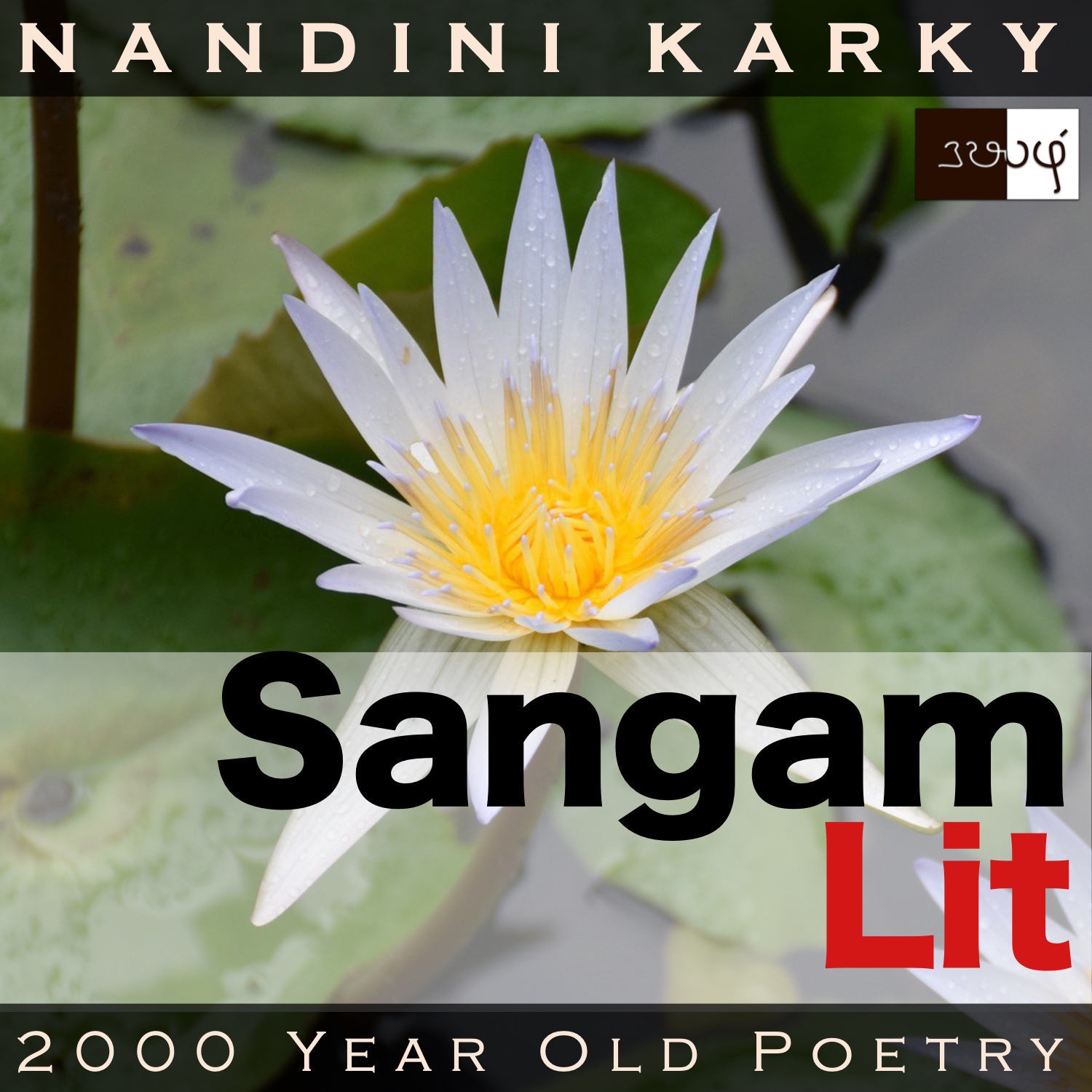Podcast: Play in new window | Download
Subscribe: Apple Podcasts | Spotify | Amazon Music | Android | iHeartRadio | TuneIn | RSS | More

In this episode, we perceive scenic descriptions depicting social dynamics, as portrayed in Sangam Literary work, Natrinai 230, penned by Alangudi Vanganaar. Set in the agricultural landscape of Marutham, the verse speaks in the voice of the confidante to the man, refusing him entry into the lady’s house.
முயப் பிடிச் செவியின் அன்ன பாசடைக்
கயக் கணக் கொக்கின் அன்ன கூம்பு முகை,
கணைக் கால் ஆம்பல் அமிழ்து நாறு தண் போது,
குணக்குத் தோன்று வெள்ளியின், இருள் கெட விரியும்
கயல் கணம் கலித்த பொய்கை ஊர!
முனிவு இல் பரத்தையை எற் துறந்து அருளாய்;
நனி புலம்பு அலைத்த எல்லை நீங்கப்,
புதுவறம் கூர்ந்த செறுவில் தண்ணென
மலி புனல் பரத்தந்தாஅங்கு,
இனிதே தெய்ய, நின் காணுங்காலே.
The verse opens with ‘முயப் பிடிச் செவி’ describing the ‘ear of a young female elephant’. Following this, we see ‘பாசடை’ meaning ‘green leaf’. Another member of the animal kingdom greets us in ‘கயக் கணக் கொக்கின்’ meaning the ‘crowding storks’. As in the case of the first line, a part of a plant follows in ‘கூம்பு முகை’ or ‘pointed bud’. Thereafter, appears ‘கணைக் கால் ஆம்பல்’ which refers to ‘thick-stemmed waterlily’. And, its fragrance is imbued with a divine quality, calling it as ‘அமிழ்து நாறு’ or ‘the fragrance of elixir’. The phrase ‘குணக்குத் தோன்று வெள்ளி’ talks about the ‘star that appears in the east’. With the phrase ‘முனிவு இல் பரத்தை’ meaning ‘courtesan, bereft of anger’, the landscape of ‘Marutham’ and its frequent theme of love-quarrel is hinted at. ‘புதுவறம் கூர்ந்த செறு’ brings forth the image of ‘a recently dried-up field’ and in contrast, ‘மலி புனல்’ talks about ‘abundant waters’. Ending with ‘இனிதே தெய்ய, நின் காணுங்காலே’, which means ‘how sweet it is, to set eyes upon you’, the poem beckons us to journey further.
The man and lady had been leading a happy married life, when the man took to visiting courtesans. The lady is angered by this action of the man. Learning of her ire, the man returns to his home to calm her and win back her affections. Seeing him at the entrance, the confidante says to him, “With green leaves akin to the ears of a female elephant, with sharp buds akin to the storks that crowd around in the pond and with thick legs, stands the water lily, a moist flower with the fragrance of an elixir. This lily spreads its buds and dispels darkness like a star on the eastern sky. O lord, in your domain, bloom such lilies in ponds filled with plentiful fish! Why don’t you leave us and return to grace your courtesan, who harbours no anger? Loneliness made us suffer immensely. But, the moment we see you, sweetness spreads, akin to the copious, cool water that flows on a dried-up field!” With these words, the confidante refuses to accept the man’s request to enter the house, revealing the lady’s anger to him, in a calm and positive manner.
Time to explore the hidden intricacies in the verse! The confidante starts by talking about a lily. She equates its leaves to the ears of a female elephant and its buds to the storks in the pond. She adds how the flower is cool and fragrant like an elixir. Then, she compares this blooming flower to the star in the eastern sky and finishes saying that such flowers are to be found in ponds teeming with fish in the land of the lord. Again, a vast description to illustrate where the man comes from but we can mine metaphors from this, for sure. Before we go there, let’s move to the latter part of the verse where she talks about the courtesan as someone who will never be angry with the man and so, asks the man to go back to that courtesan. Through this, the confidante indicates in a subtle manner that the courtesan has no right to be angry as the man is not hers rightfully. Then, using a picturesque simile, she describes how the lady has been anguished by loneliness akin to a dried-up field, and we can imagine the lady’s depressed state and the parched soil of the land together in the same frame. Then she adds, just like how this dried-up field turns when water rushes through it, the lady delights in the mere sight of the man. And without saying so, the confidante implies that seeing the man now and then would be sufficient to grace the lady’s heart, leaving him to return to that courtesan!
Returning to that description of the waterlily in the man’s land, when it’s compared to the star in the eastern sky, it is to say that even though the lily blooms like the star, it cannot become the star. Likewise, the courtesan may render joy unto the man but she can never take the place of the lady, the confidante implies. Herein, we see a unique way of expressing anger using positive words. When even speaking with civility is a hard thing to achieve the moment anger hits us, the poem seems to go a step further and suggest this cool way of expressing the fire of anger with fragrant words of positivity!




Filled with refreshing images ❤️